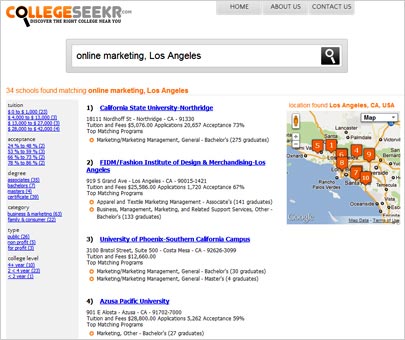
How does a high school student looking for a college to further their education find the perfect program? Answering that question, Fred Jambukeswaran found a niche and
created collegeseekr.com. Rather than clicking through multiple pages and screens, the search engine aggregates and pulls in data from Web sites based on location, which could become a gold mine for
brands looking to connect one on one with students through recommendations, retail and restaurants.
While the search engine provides details on school names, locations, numbers of yearly
graduates, tuition fees, acceptance rates, degrees, categories, types of schools, and college levels, searching on the engine reveals a lack of formal instruction in specific disciplines, such as
search engine marketing, that universities could capitalize on.
As for Jambukeswaran, he could be missing a great opportunity for brands across many types of businesses to connect with
students. Today the site doesn't offer paid-search or display ads, but think of it connecting brands with students for every type of local business that supports activities and services, from
restaurants and coffeehouses to real estate and housing to clothing and bookstores.
The engine. built on Apache Lucene, an open-source project, supports a query parser that analyzes the
location entered in the search box. It also uses an API to convert the code into a region or location before serving up the most relevant colleges, degrees, certificate programs, and other
information.
Jambukeswaran plans to integrate job pay scale data into the site, too. It would sit along the left rail, so students willing to spend $20,000 and up could decide on
whether the job would pay for the education. Long-term, he wants to build in college reviews similar to business reviews on Yelp. "Search is how you start," he said. "Then you branch out to other
areas. First, let's see how it does."
How the engine catches on will depend on Jambukeswaran's enthusiasm to connect with colleges and universities, and the extent to which he integrates
technologies, such as voice search, targeted or exploratory, and social signals. Back in April 2010 at the Search Insider Summit, Michelle Prieb -- a project manager at Ball State University at the
time -- tapped into the minds of college students to find out what they want in a search engine. It may be worth exploring that
topic at the next summit again.
The U.S. Department of Education offers college navigation tools, but they're not as easy to use, and don't provide all the information on one page.